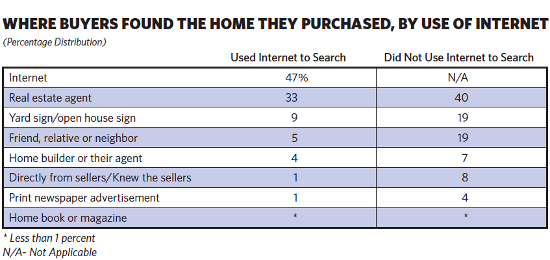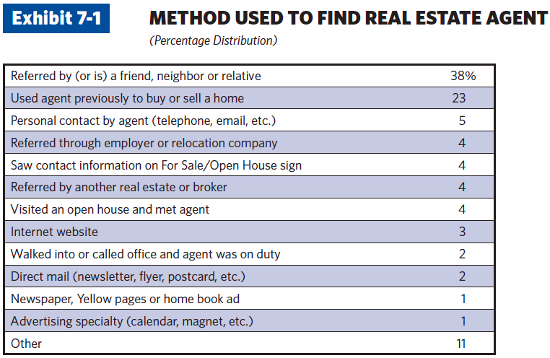You are viewing our site as a Broker, Switch Your View:
Agent | Broker Reset Filters to Default Back to ListRewind: Why Zillow and Trulia Don’t Matter Today
December 24 2013
We're continuing a holiday tradition of revisiting classic articles from the past year. This article was originally published back in August. Enjoy!
Let's start by stipulating two arguments: First, that every listing needs a buyer. Second, that most buyers find the home they bought on the internet. We might even throw in a third truism in real estate: a powerful web presence can bring in lots of business for most real estate brokers. All fine and well.
Except for one thing: the market.
It's true that most buyers today find their homes on the internet. According to NAR Research:

It's also true that buyers like to use major web portals to do search for those homes. By and large. Yet the fact remains that most real estate remains local (most buyers moved less than 15 miles last year) and that local brokerage websites remain more-than-capable of capturing that buyer traffic. See the broker-revolt against sharing listings with major portals as market evidence of this fact (more here and here). And while there will always remain a large, soft chunk of the industry that prefers to outsource its buyer marketing and lead generation to third parties, Zillow and Trulia will hum along nicely for some time to come.
None of which really matters today. Because it's not a buyer's market any more. It's a seller's market.
That's because today, the game isn't finding buyers but capturing sellers. For lots of reasons – investors, artificially low interest rates, strangling foreclosure laws - the nation is suddenly facing an inventory shortage in housing again. Builders are actually building new homes at record paces again in major metros across the country. Bidding wars are back. Housing prices are rising. Call it a bubble, as we do, but it's here and it exists...
... and your marketing plan had better deal with it, for the foreseeable future.
That means temporarily putting aside the usual "how do we compete against the portals" strategy and designing a strategy to encourage consumers to bring their homes into the marketplace. To move up, move down, or relocate. To encourage sellers whose balances have just slightly bobbed above water to take "even" for a price and move on with their lives. Less concern about getting Gen Y to move out of the cellar, and more concern with bringing properly sized and priced inventory to attract them out into the market.
Besides: without inventory, what are you going to put into your Zillow-Trulia-competing website anyway? Your competitors' inventory? Nah: You probably won't co-broke your way to financial success in the real estate industry. You need listings.
So, what should your marketing strategy be focused on for at least the next 6-12 months? Building trust and relationships that encourage sellers to notice, hear and agree with your message to bring their homes onto the market sooner, rather than later. Which means using entirely different tools. Again, some research to start:

Translation: The primary way sellers found their agent was through relationships. Friends, family, referrals – all human sources of information. All built around trust, not hits, and four times more effective than a web page. Your marketing plan must focus on relationship-building techniques. Phone calls, if you must. Luncheons, if you have time. Emails, if you like. Social media cannot be denied. More content, more stories, more videos. Not about bedrooms or baths or even prices – but about trust and knowledge and market reality.
It also means using technology for the right reasons. Maybe worry a little less about how your website looks on a tablet, and more on how it helps agents with a tablet to build relationships. Evaluating your social media and e-newsletter content to engage with, discuss, explore, not just inform. Not what's new, for sale, reduced in price, but asking, listening, advising.
Today's marketing plan needs to be more relationship focused than distribution focused. A few strong relationships can generate plenty of new inventory, as our friend Angela Galvin reports happened right on her Facebook page.

As the result of a positive social media testimonial – built from a strong relationship – from a satisfied client, Angela generated four listings and five referrals. Smart real estate agents need to use technology to make relationships happen, not just advertising. Less ads and more likes. Fewer clicks and more connections. Their marketing plan has to encourage inventory, not just awareness. And the primary source of new listings continues to be people, not portals.
So, ramp up your personal contacts (any way you're comfortable doing it). Anchor your prospecting efforts on leveraging relationships. Focus your discussions on building rapport. Rebalance your marketing efforts according to the market forces, which means getting the inventory before worrying about how to promote it!
To view the original article, visit Matthew Ferrara's blog.









